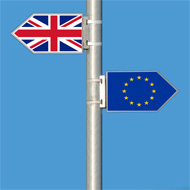
Voices concern over 'anti-foreigner' rhetoric
The BVA together with the RCVS have sent a joint letter to the Prime Minister raising concerns over how Brexit, and its impact on EU migration may affect the veterinary profession.
The letter outlines how the organisations want to work with the government to ensure the best possible outcome for animal health and welfare, public health and the veterinary profession post-Brexit. It also voices concern that perceptions of ‘anti-foreigner’ rhetoric may already be having an impact on the veterinary workforce.
Below is the full text of the letter sent to the Prime Minister on the afternoon of Tuesday 18 October 2016:
Dear Prime Minister,
Like all professions and sectors, we are currently involved in detailed debates regarding how Brexit is likely to affect our members and how we can best harness the opportunities it may present. We are very keen to work with the government to make a success of Brexit within our sector. The veterinary profession plays a crucial role in protecting public health, relies heavily on EU graduates and is already feeling the impact of the EU referendum.
The UK veterinary profession is made up of over 26,000 veterinary surgeons and over 11,000 veterinary nurses, working to improve the health and welfare of animals, to monitor and control the spread of diseases, and to assure the safety of the food we eat. Each year around 50% of veterinary surgeons registering to practise in the UK are from overseas, with the vast majority coming from the EU. EU veterinary surgeons make a particularly strong contribution to public health critical roles such as working in the Government Veterinary Services. In the meat hygiene sector some estimates suggest 95% of veterinary surgeons graduated overseas. Consequently, Brexit and accompanying changes to the mutual recognition system or immigration restrictions could have a profound impact upon the veterinary workforce.
We are currently considering how best to manage the potential impact on the veterinary workforce, and will be very pleased to discuss these issues with the relevant government departments in due course. However, even before Article 50 is triggered we are experiencing a negative impact on the existing veterinary workforce.
We have received reports that the increasing focus on foreign workers is causing personal distress to individual members of the veterinary profession who live and work in the UK. There are also reports of a negative impact on recruitment and retention: those involved in public health critical roles, such as meat hygiene, are having increasing difficulty recruiting much needed EU veterinary surgeons to work in the UK; leading experts from overseas are turning down employment offers from top UK universities; and many others are considering leaving the UK due to a feeling it is no longer welcoming to foreigners. There is a danger that the language and rhetoric around Brexit, alongside the ongoing uncertainty for non-British EU citizens, could seriously impact the veterinary profession’s ability to fulfil its essential roles.
The government has encouraged professions like ours to present factual data on the EU migration issues so that you can fully understand the challenges the country faces. The RCVS has begun the process of commissioning detailed research into the impact that Brexit is having upon those working in the profession and the implications this could have for the veterinary workforce. We will keep your officials informed as to the results of this research.
In the meantime, we reiterate our call for the government to protect the status of non-British EU vets and vet nurses currently working and studying in the UK, and urge Ministers to be mindful of the negative impact of what may be perceived as ‘anti-foreigner’ rhetoric.
We are committed to working with you to identify opportunities created by Brexit for animal health and welfare, public health and veterinary research and to realise our joint vision for the UK to continue to lead in these areas, and we are keen to maintain close communication with you and your colleagues as the negotiations develop.
Yours sincerely,
Chris Tufnell, President, Royal College of Veterinary Surgeons
Gudrun Ravetz, President, British Veterinary Association



 The latest
The latest